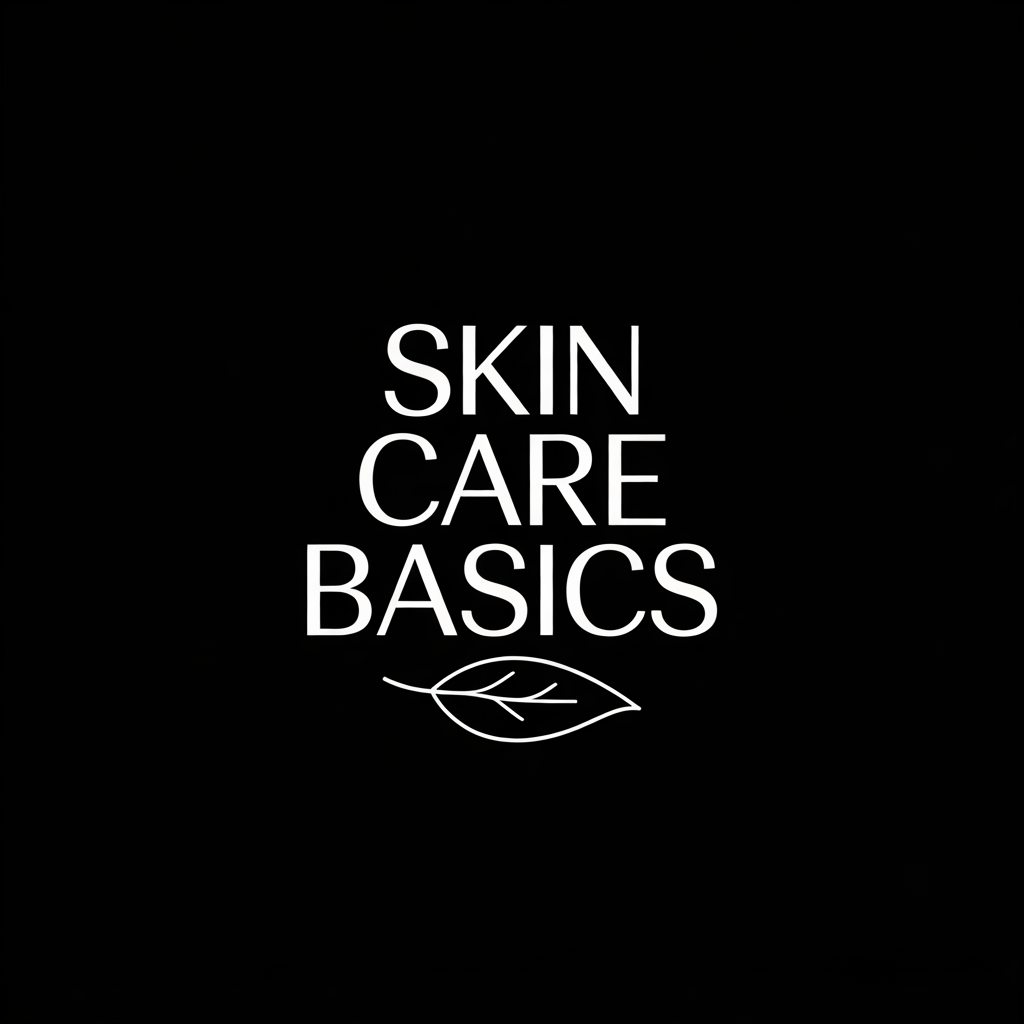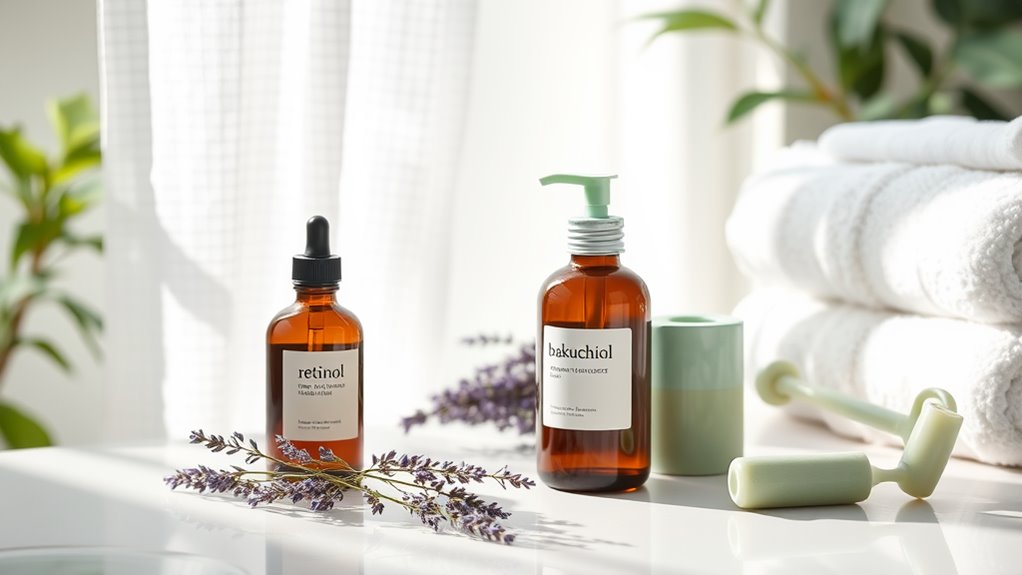Retinol vs. Bakuchiol- Which Is Safer for Your Skin.
Retinol has long been hailed as a powerful anti-aging agent, but it’s not without its drawbacks. Many users experience irritation and sensitivity, raising questions about its safety. In contrast, bakuchiol emerges as a gentler, plant-derived alternative that claims similar benefits with fewer side effects. So, how do these two ingredients stack up when it comes to skin safety? Understanding their differences is crucial for making an informed choice for your skincare routine.
Key Takeaways
- Retinol can cause irritation, redness, and peeling, especially for sensitive skin, while bakuchiol is typically well-tolerated with fewer adverse reactions.
- Bakuchiol, derived from natural sources, provides similar anti-aging benefits without causing sun sensitivity or irritation associated with retinol.
- Retinol yields quicker results in anti-aging and acne reduction, but its side effects may outweigh its benefits for some users.
- For those with sensitive or dry skin, bakuchiol serves as a gentler alternative, improving skin elasticity with minimal irritation.
- Individual skin tolerance varies, so patch testing and consulting a dermatologist are recommended for personalized advice on using either ingredient.
Understanding Retinol: Benefits and Risks
Retinol, a derivative of vitamin A, is renowned for its potent anti-aging properties and skin rejuvenation effects. It promotes cell turnover, reduces fine lines, and improves skin texture.
However, you should be aware of its potential side effects, including irritation, redness, and peeling, especially for sensitive skin types.
Gradually introducing retinol into your routine can mitigate these risks.
For those who experience adverse reactions, retinol alternatives like peptides and antioxidants may provide similar benefits with less irritation. Additionally, bakuchiol is a natural alternative that offers similar anti-aging effects without the harsh side effects often associated with retinol.
Always consult a dermatologist to determine the best approach for your skin type and concerns, ensuring optimal results without compromising your skin’s health.
Exploring Bakuchiol: A Natural Alternative
Bakuchiol has emerged as a popular natural alternative to retinol, attracting attention for its impressive skin benefits without the harsh side effects often associated with retinoids.
Derived from the seeds and leaves of the Psoralea corylifolia plant, bakuchiol offers antioxidant and anti-inflammatory properties.
Research indicates it can stimulate collagen production, improve skin elasticity, and reduce the appearance of fine lines and wrinkles, similar to retinol. Additionally, bakuchiol may enhance collagen for wrinkle prevention by promoting the skin’s structural integrity.
It’s suitable for all skin types, including sensitive skin, and doesn’t cause irritation or sun sensitivity.
This makes bakuchiol an appealing option for those seeking gentler yet effective skincare solutions.
Comparing Effectiveness: Retinol vs. Bakuchiol
When considering options for skin rejuvenation, understanding the differences in effectiveness between retinol and bakuchiol can significantly impact your skincare routine. Research indicates that while retinol effectively reduces fine lines and wrinkles, bakuchiol shows comparable results with less irritation. Additionally, both ingredients are known for their proven results in enhancing skin texture and tone.
| Ingredient | Effectiveness |
|---|---|
| Retinol | High (anti-aging, acne) |
| Bakuchiol | Moderate (anti-aging) |
| Speed of Results | Quick (weeks) |
| Skin Tolerance | Variable (may irritate) |
Ultimately, choosing between the two depends on your skin’s needs and sensitivity, as both offer unique benefits.
Skin Sensitivity and Reactions
How does your skin react to different ingredients?
When using retinol, many experience redness, peeling, or irritation, especially during initial application.
This sensitivity stems from retinol’s ability to accelerate cell turnover, which can disrupt your skin barrier.
In contrast, bakuchiol is often well-tolerated, causing fewer adverse reactions.
Clinical studies indicate it may reduce irritation while providing similar anti-aging benefits.
However, individual responses vary; patch testing is crucial.
If your skin shows persistent sensitivity or reactions, consider adjusting your usage frequency or switching to a gentler alternative.
Always consult a dermatologist for personalized advice tailored to your specific skin needs.
Incorporating a simple routine can further help manage sensitivity and promote a balanced complexion.
Long-Term Use and Skin Health
Long-term use of skincare ingredients like retinol and bakuchiol can significantly impact your skin’s overall health and appearance.
Retinol, a Vitamin A derivative, is known for its ability to enhance collagen production and improve skin texture, but prolonged use may lead to irritation or sensitivity.
In contrast, bakuchiol, a plant-based alternative, shows promise in promoting similar benefits without the harsh side effects.
Studies indicate that bakuchiol can improve skin elasticity and reduce fine lines, making it a gentler option for sustained use.
Ultimately, assessing your skin’s response over time is crucial in determining the best fit for your long-term skincare regimen. Additionally, understanding common anti-aging myths can help you make informed choices about which ingredients to incorporate into your routine.
Choosing the Right Option for Your Skin Type
When choosing between retinol and bakuchiol, it’s crucial to consider your skin type and sensitivity levels.
Retinol may benefit oily or acne-prone skin but can cause irritation in sensitive individuals. Conversely, bakuchiol offers a gentler alternative, making it suitable for those with reactive or sensitive skin. Individuals with sensitive skin should be cautious of common mistakes that can lead to irritation and discomfort.
Skin Type Considerations
Choosing the right product for your skin type can significantly impact your skincare results, especially when deciding between retinol and bakuchiol.
| Skin Type | Recommended Product |
|---|---|
| Oily | Retinol |
| Dry | Bakuchiol |
| Combination | Both (cautiously) |
For oily skin, retinol’s oil-regulating properties can be beneficial. If you have dry or sensitive skin, bakuchiol offers a gentler alternative without irritation. Combination skin may benefit from both, but introduce products gradually. Always consider your unique skin needs and consult with a dermatologist for tailored advice.
Sensitivity and Tolerance Levels
While retinol is renowned for its efficacy in promoting cell turnover and reducing signs of aging, it can also provoke irritation, especially for those with sensitive skin.
If you have a history of redness, dryness, or allergic reactions, bakuchiol may be a better option.
Research indicates that bakuchiol offers similar benefits without the harsh effects commonly associated with retinol.
It’s essential to assess your skin’s tolerance levels; start with lower concentrations and gradually increase usage.
Always patch test new products.
Ultimately, choosing between retinol and bakuchiol should align with your skin’s sensitivity and your long-term skincare goals.

